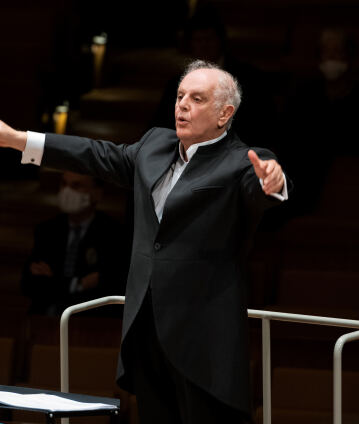Daniel Barenboim conducts Smetana’s “Má vlast”

Everyone knows Bedřich Smetana’s The Moldau – but almost no one knows the cycle Ma vlast, from which this wonderful river portrait is taken. But Smetana’s vision of creating a panorama of his Czech homeland is only conveyed in the complete work, with its vivid descriptions of nature and dramatic depictions of myths and historical events. At the helm of this performance is Daniel Barenboim, honorary conductor of the Berliner Philharmoniker, who has a particular flair for the powerful colours of late-Romantic music.
It was not just an affront to Bedřich Smetana – the Viennese conductor Johann Herbeck put his finger in the wound of an entire nation with patronising provocation: the encounter took place at the Altenburg in Weimar in 1857 in the presence of the host Franz Liszt, who was on friendly terms with Smetana. When the question arose as to what the individual nations had achieved in music, Herbeck’s judgement was: “The Bohemians have nothing”, because, he said, “you don’t have a single work that is so inspired by the Czech spirit that it could be an enrichment of European music literature.” Liszt immediately jumped to his friend’s side, played Smetana’s Characteristic Pieces op. 1 on the piano and exclaimed: “Here you have the composer with the true Bohemian heart.”
Although Smetana’s national pride was wounded, he had to quietly admit that Herbeck was not entirely wrong. The culture of the Czechs had been suppressed over two centuries under constant foreign rule – Smetana himself spoke German better than Czech, as the latter was frowned upon in the Austro-Hungarian multi-ethnic state. The desire for identity became increasingly personal for Smetana after this incident: with his cycle Má vlast, composed between 1872 and 1879, he succeeded in giving his people a musical voice.
The first of the six “symphonic poems” Vyšehrad, named after the Prague royal castle rock, begins with a magnificent harp solo. This represents the song of a bard, who Smetana had in mind as the narrator of his musical epic. The memory of the splendour and decline of the old Bohemian rulers is followed by the now famous Vltava, a contemporary, timeless depiction of nature with a captivating musical dramaturgy. Šárka introduces us to the world of folk myths. In From Bohemia’s Woods and Fields, idyllic natural beauty meets the exuberance of folk dance. Tábor then honours the Hussite religious warriors with the chorale “You who are God’s fighters”. The same chorale – transformed into a victory hymn – is heard in Blaník, which depicts the salvation of Bohemia by St Wenceslas. Smetana was never to hear the cycle himself; he went deaf within a very short time in 1874.
© 2020 Berlin Phil Media GmbH
Related interviews
Artists
Our recommendations
- Daniel Barenboim conducts the 1997 Europakonzert from Versailles
- Itzhak Perlman and Daniel Barenboim perform Beethoven’s Violin Concerto
- Daniel Barenboim plays Mozart’s Piano Concertos Nos. 20 to 27
- Daniel Barenboim and Martha Argerich
- Daniel Barenboim conducts Verdi
- Daniel Barenboim and Yefim Bronfman perform Brahms’s Piano Concerto No. 1